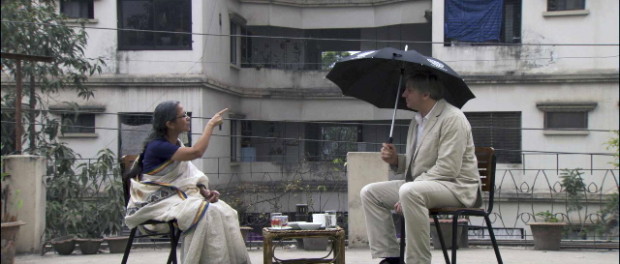Review: Population Boom Asks How Many are Too Many
There are presently seven billion people who call the Earth home. With that astonishing figure in mind many people have raised questions about the effects of overpopulation on our planet. How many people are too many? That’s the question at the heart of filmmaker Werner Boote’s latest documentary, Population Boom.
Armed with his trusty World Bank umbrella, Boote travels the world in order to put a human face on the issue of overpopulation. The filmmaker journeys to a variety of countries including the United States, Bangladesh, Mexico, Kenya, India, Japan, China, and Finland in order to investigate the effects of the world’s rising population. The film places special emphasis on how the so-called population boom has played a role in terms of determining government policy as well as shaping the lives of private citizens and their families. Increasing population rates have been used to influence a wide-ranging array of issues such as the economy, gender politics, immigration policy, pollution, and climate change.
In Population Boom, Austrian writer and director Werner Boote asserts that the issue of overpopulation has been used by the powers that be (i.e. governments, the international banking system, and the oil industry) as a diversion to take public attention away from the truly important issues plaguing our world (global warming, economic imbalances, and over-consumption). Boote believes that overpopulation has been used as a scapegoat by the world’s biggest economic powers and a way to shift blame away from big business and our modern consumer culture and onto the backs of the poorest and most disenfranchised members of society.
One of the strengths of this insightful documentary is that it not only provides some staggering statistics (i.e. one seventh of the world’s citizens live below the poverty line) but also includes an array of one-on-one interviews. In one particularly powerful sequence, Boote explores the slums of Mumbai and visits with a poor family. He then speaks with an official who explains the Indian government’s family planning incentive program. This is followed by a clip from a TV interview with India’s richest man, in which he boasts about the large number of millionaires living in his country. Boote then points out that the successful businessman’s highrise home comes complete with a panoramic view of Mumbai’s most poverty stricken slums.
Among the people interviewed in Population Boom are notable figures as Farida Akhter, a Bangladeshi actress and social activist; Babatunde Osotimehin, the executive director of the United Nations population fund; author Betsy Hartmann; Hu Hongtao, the director general of China’s National Population and Family Planning Commission; and demographer Wolfgang Lutz. The film also includes an archival clip of John Lennon stating his belief that overpopulation is a myth which is being used to take people’s minds off more important issues.
After traveling around the world and speaking with a variety of experts and members of the general public, Werner Boote concludes Population Boom with the notion that overpopulation isn’t the catastrophic problem that we’ve been told it is. Instead, the filmmaker asserts that the real threat lies within problems such as over-consumption, an international banking system which is set up to support and protect the richest members of society, inherent racism, and government policies which rely on exploiting the poor for economic and political gains. Boote sums up his findings best when he refers to a Gandhi’s famous words: “The world has enough for everyone’s need, but not enough for everyone’s greed.”
Population Boom is available now from First Run Features.








